#huge magazine 2006
Explore tagged Tumblr posts
Text

HUGE, SEPT 2006 | THESE GREY DAYS DIOR HOMME: AW06 x HEDI SLIMANE
#fashion#HUGE magazine#editorial#dior#fashion photography#hedi slimane#black and white#monochrome#00s#fall 2006#photography#u
45 notes
·
View notes
Text

Raf Simons A/W 2006 Alien Hoodie Huge Magazine ‘Experimentalism’ Editorial
97 notes
·
View notes
Text
Bass Magazine - Reita interview (2022)
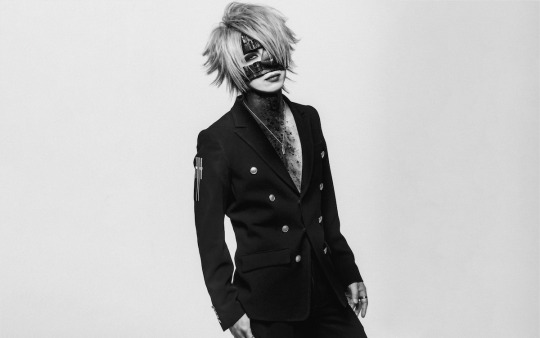


In 2022, the GazettE celebrated their 20th anniversary by releasing an expansive three-disc best-of album, the GazettE 20TH ANNIVERSARY BEST ALBUM HETERODOXY-DIVIDED 3 CONCEPTS, featuring 47 tracks. Each disc contains songs selected by the band members, encapsulating the band’s history and evolution over the past two decades.
Bassist REITA’s playing, in particular, showcases how he has adapted his approach to support the increasingly heavy band sound, while maintaining a firm foundation for the ensemble.
We had a chance to speak with REITA about the band’s two-decade journey and the evolution of his bass playing.
Interviewer: First of all, congratulations on your 20th anniversary. How do you feel now, having reached this milestone?
Reita: Thank you. Honestly, it feels like we’ve been charging forward without stopping, and suddenly, we realized it’s been 20 years. Saying “20 years” out loud makes me think, “Wow, we’ve really been doing this for a long time”. Still, it doesn’t feel like 20 years to me. It feels shorter, almost like we’ve only been doing this for about five years or so (laughs).
Interviewer: So, it feels like the time flew by. That said, it’s rare for a band to continue for 20 years. What do you think has been the key to your longevity?
Reita: Hmm… I think it’s because all of us in the band have always shared the desire to stay at the forefront. Many bands that last 20 years usually have periods where they take a break, right? But for us, we’ve always had this collective mindset of wanting to keep going, of not wanting to take a break. That shared commitment among all the members has been a huge factor, I think.
Interviewer: The three-disc best album the GazettE 20TH ANNIVERSARY BEST ALBUM HETERODOXY-DIVIDED 3 CONCEPTS- includes 47 tracks divided into SINGLES, ABYSS, and LUCY. Could you tell us about the concepts and song selection for each?
Reita: The SINGLES disc is simply a collection of our singles arranged in the order they were released. Of course, there was an option to release just this one disc, but we felt that wouldn’t capture the full picture of who we are. So, we decided to add to it. Previously, we’d done concerts themed around “ABYSS,” focusing on slower, deeper tracks, and “LUCY,” which featured intense, loud tracks. Taking inspiration from that, we created the ABYSS and LUCY discs by selecting songs based on those concepts. With these three discs, we feel we can show both—the face of the band and our essence as a live act. We thought that this would be the best way to get people to understand the GazettE.
Interviewer: Did you select tracks for “ABYSS” and “LUCY” from their respective live setlists?
Reita: That's right. We chose the songs together while discussing, “If we were to do ABYSS or LUCY concerts now, which tracks would we play?”
Interviewer: Using the tracklist of SINGLES as a starting point, let’s delve into the GazettE’s 20-year journey and your evolution as a bassist. Listening to the first track, "Cassis," I can really sense how both the band’s sound and your bass playing have developed over time.
Reita: Yeah, the phrases and the tone definitely feel youthful to me now (laughs). The bass playing on singles tends to be pretty simple overall. Even now, we still perform some of our older songs live, and there are definitely elements in those songs that still resonate with our current approach. So, even when I play them today, they don’t feel entirely out of place.
Interviewer: Up until your second album NIL (2006), which features “Cassis,” the band had a melodic and pop-influenced sound. Your bass lines often seemed to connect closely with the melodies, utilizing mid-range phrasing.
Reita: That’s right. These days, I often play phrases that are in unison with the guitars, but back then, we weren’t using the low-A tuning we use now, and my playing often involved following the melody. Without emphasizing the mid-range, the phrases wouldn’t have stood out. I also thought that simply supporting the low end wasn’t enough. Plus, I was young and had this urge to push myself to the forefront.
Interviewer: What kind of tuning were you using during that period? The bass sound also feels relatively clean.
Reita: Back then, all the strings were tuned down by one whole step. The recording environment was completely different from what we have now, too. We’d record in tiny, two-tatami-mat-sized studios that cost about 40,000 yen a day. And we could only make noise until around 9 PM (laughs). That meant we had limited time, and there were constraints on how much we could refine the sound. At that time, I didn’t have multiple amps to experiment with either. I just recorded with a single bass and used either the Ampeg or Markbass amp I owned back then. We couldn’t tailor the gear selection to each song like we do now.
Interviewer: Thank you for sharing those early-career struggles! Moving on, with tracks like “Filth in the beauty” and “Hyena” leading the way, STACKED RUBBISH (2007) marked a shift towards a heavier, breakdown-driven sound. It feels like a turning point for the band. How do you look back on that period?
Reita: I definitely see that era as a turning point. The sound we developed around the time of “Filth in the beauty” still lives on in what we do today. I think that period laid the foundation for where we are now. At the time, there was a trend for songs with big, groove-heavy rhythms, and we were also aiming to create tracks with those kinds of rhythms.
Interviewer: This was the time when sounds like metalcore and screamo were rising in popularity. Did those influences play a role?
Reita: I wouldn’t say we were consciously aiming for that, but back then, I was listening to bands like Limp Bizkit and Linkin Park and I wanted our fans to feel that kind of vertical rhythm. So even though we weren’t intentionally drawing from nu-metal influences of the late 90s and after, they probably crept in subconsciously.
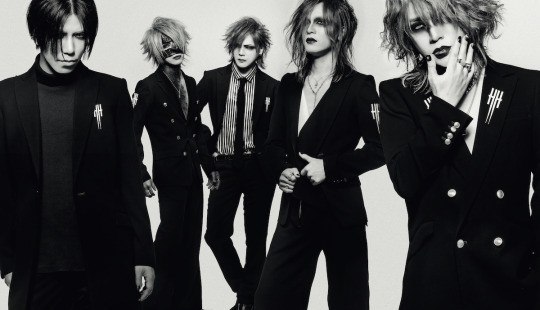
Interviewer: Around this time, you dropped the tuning down to low B. With such a heavy sound, I imagine the demands on your bass playing also changed. Is that something that's still relevant to the current band dynamic and your playing style?
Reita: That’s right. Back then, we tuned down to low B, and I was using my white ESP signature model. Around that time, my playing became more focused on adding depth and weight to the sound. After recording STACKED RUBBISH, I started expanding my gear collection rapidly. I wanted more options, so I was buying a new bass almost every month (laughs). The style of music we played back then still aligns with what we aim for as a band today. And in terms of the sound I want to produce and the role I want the bass to play, the experience I gained during that period has been hugely influential.
Interviewer: Starting with TOXIC (2011), which includes tracks like "VORTEX" and "Red," the band adopted low-A tuning for both guitar and bass. This was a bold decision, and I think it was the moment when your approach to bass and your way of playing changed drastically.
Reita: I believe it was Uruha (guitar) who first brought in songs with low-A tuning, but honestly, my initial reaction was like, “A, seriously…?” (laughs). The other members create songs using programmed basslines, where low A notes come out cleanly and easily. But actually playing those notes live? That was difficult at first. Especially with the more aggressive songs, sometimes I’d have no idea what I was even playing. It got to the point where, during recording, I couldn’t tell whether a take was good or bad. I guess back then, I didn’t fully understand how to create a proper low A sound. Now, though, anything other than low A feels off. But at the time, it was a real struggle to get used to.
Interviewer: Around that time, you also started using a 35-inch scale bass with Bartolini pickups. Was this part of your approach to adapting to the heavier band sound?
Reita: Yeah. It was all about how to produce a precise low A sound. I asked ESP to make me a red-colored super long-scale model, with various modifications to achieve greater string tension. They added a tension bar on the headstock to create a steeper angle and made the bridge string-through to increase tension as much as possible. I always liked and was most comfortable with the JB-style bass, but it wasn’t ideal for producing heavier tones. That’s why we made a new model with altered pickups specifically for low A tuning.
Interviewer: You were using a 4-string bass but stringing it with the 2nd to 5th strings of a 5-string bass. Was using an actual 5-string bass ever an option?
Reita: Honestly, I think I missed the right timing for that decision (laughs). Back then, I had this stubborn mindset that “bass is supposed to have four strings.”, “Using a 5-string bass is heresy.” There was a period when I did use a 5-string, but I wouldn’t string it with the 1st string—it was this weird fixation I had. Looking back now, I regret not getting comfortable with a 5-string earlier (laughs). That said, I own plenty of 5-string basses, so who knows? There might come a time when I fully switch to them.
Interviewer: I see (Laughs). On TOXIC, there are also mellow tracks like "PLEDGE," which remind me of the early phases of your music. It seems like the album showcases not just heavy bass work but also a variety of approaches adapted to different songs.
Reita: When we were making TOXIC, we had our Tokyo Dome performance coming up and were releasing singles one after the other. Naturally, since singles would end up on the album, we couldn’t fill it with just heavy tracks—it wouldn’t have been balanced. As a result, the album ended up with a mix of different types of songs. But thanks to that, I think, my range as a bassist expanded.
Interviewer: In 2013, you released your 7th album, BEAUTIFUL DEFORMITY, and embarked on your first world tour. Looking back on that experience, how do you feel?
Reita: The world tour was an incredibly significant experience. I’ve always been the type who thrives in challenging environments, and live venues overseas often don’t have the same great setups as those in Japan. I think my mentality of being prepared for tough conditions served me well on tour. As a bassist, I think it’s important to maintain an air of composure. Panicking on stage doesn’t look cool—it’s crucial to project this sense of “I’ve got this, no matter what.” Also, since most of the audience overseas were seeing us live for the first time, it reminded me of the early days when we played joint events at live houses. Watching people in the back start to move along to the music gave me a nostalgic feeling—it was similar to those early days.
Interviewer: As evident from "UGLY," since 2015’s DOGMA, the band has leaned into a louder ensemble with strong metalcore and deathcore influences. Has there been a greater demand for "heaviness" in your bass playing as well?
Reita: Absolutely. With songs like these, there's a clear demand for more extreme heaviness. It felt like the theme of "heaviness" was being challenged anew. That’s why a song like "DOGMA" was particularly difficult.
Interviewer: To achieve even greater heaviness and intensity, did you use any new gear or techniques?
Reita: In terms of gear, BEAUTIFUL DEFORMITY was recorded with a ZON bass, but for DOGMA, I used a Music Man StingRay exclusively. ZON basses produce a balanced sound across all frets and are great for intricate, moving phrases. However, for DOGMA, where there are a lot of unison lines and a heavier focus, the StingRay’s distinct humbucker punch stands out better and fits the ensemble more.
Interviewer: I see. By the way, what gauge strings are you using for low-A tuning?
Reita: I use .130 for the thickest string. It’s not an extremely heavy gauge; it’s fairly standard.
Interviewer: For achieving heaviness with the low A string, picking technique is also an important consideration. Is there anything specific you focus on?
Reita: I adjust the strength of my picking based on the song. The faster the song, the lighter my picking. Lighter picking provides more consistent resonance and helps maintain the strings' stability. With mid-tempo songs, you can play with more force without issue, but in faster tracks, softer picking sounds noticeably more stable. When I played with the same intensity as before, the strings would vibrate too much and couldn’t keep up, so I was reminded once again that picking strength is important.
Interviewer: Additionally, in heavy ensembles, you need to adapt your sound to match the low-end presence of the guitars and drums. How do you approach that?
Reita: Guitars also need to bring low-end presence, which means their core sound starts to overlap with the bass's low end. This can result in both instruments canceling each other out, which defeats the purpose of the ensemble. My initial thought was to move even lower, but when you go too low, the sound doesn’t project clearly anymore—it just spreads out without definition. Balancing that was challenging. The bass drum's size also kept increasing—starting at 22 inches, then 24, and eventually 26 inches. Balancing the low-end frequencies between all the instruments became a significant area of trial and error.
Interviewer: When the guitars’ low-end overlaps with the bass, do you ever coordinate with the guitarists to resolve this?
Reita: My approach is more reactive—I try to use the available space. I don’t recall ever asking the guitarists to "cut back on the low end." Instead, it’s more like, "If they’re bringing that much low-end, I’ll adjust and find my space elsewhere."
Interviewer: In 2014, you performed at LOUD PARK 14, and in 2016, at KNOTFEST JAPAN 2016. Do you think participating in these metal festivals influenced your transition toward a heavier, louder sound?
Reita: I think it played a significant role. After performing at those metal festivals, we released DOGMA. And while we were there, we also took the opportunity to listen to various bands' sounds and learn from them. As a band, I think we consciously decided to head in a louder, heavier direction.
Interviewer: Listening to your playing, Reita, even within the heavy, dense phrasing, I noticed that in the sections with clean vocals, you match the melody with thoughtful note choices and phrasing. It feels like you’re adding color to the song, even within a heavy sound.
Reita: That’s true. While we’ve been leaning toward more metalcore sound, my musical roots don’t include much metal. Naturally, I gravitate toward creating more active, moving phrases. That kind of phrasing feels closer to my musical roots. Also, I feel like clean vocal sections are a prime opportunity for the bass to shine. Sometimes, during recording, I’ll suggest a line for a clean section, and it gets shot down with, "We don’t need bass here." (laughs) The lines that make it into the final track are the ones that somehow survived the process. I feel like subtle moments like those really showcase the bass as an instrument.
Interviewer: How would you describe your current approach to sound design? Your tone seems to emphasize a midrange core while also incorporating aggressive high-gain distortion, rather than the traditional scooped sound.
Reita: These days, I lean heavily into distortion. In the past, I used to focus on the 60–80Hz range for the low-end peak, but now I aim around 130Hz. Since MASS (2021), I’ve been deliberately crafting my sound around that frequency range. I’ve moved away from the mindset that "lower is better." Instead, I aim to create a low end that’s more audible and practical—something that still sounds good even when played on computers. Considering how many people listen to music this way, I'm conscious of making sounds that are easy to hear even on computer speakers.
Interviewer: So, you're adjusting the frequency range to suit modern listening environments.
Reita: Super low frequencies depend a lot on the speakers or earphones used for playback. But if you focus on slightly higher lows, they come through well on most speakers. That’s why I try to create lows that can be reproduced clearly on any speaker.
Interviewer: Looking back on everything we’ve discussed, how do you feel about the changes in the band’s sound and the evolution of your bass playing and sound?
Reita: In the early days, I really wanted to stand out on stage and make the bass felt in the forefront—it was all about getting the bass out there. But as time passed, I started wanting to play more in the background. That shift became especially noticeable around the time of Filth in the Beauty. Back then, I used to move around a lot on stage, but now I tend to stay close to my cabinet. I think my approach shifted from "assertive bass" to "supporting bass" over time.
Interviewer: Was this a deliberate shift in perspective for you?
Reita: Hmm... maybe it was the songs themselves that led to that change. When the songs became louder and more unison-based, I felt like the bass had to support the sound more. But now, I feel that kind of bass is ideal for me. After 20 years, I guess there’s a certain maturity that comes with it (laughs).
Interviewer: Lastly, as the band marks its 20th anniversary, what are your plans for the future?
Reita: To keep moving forward without stopping, so that one day people will say, “Oh, it’s their 30th anniversary already?” I want us to keep battling at the forefront. Many veteran bands tend to scale back live performances, focusing on just a few large shows each year. But that approach doesn’t really suit us. We want to keep a down-to-earth feel. Of course, we want to play at big venues too, but we also want to keep doing proper tours and traveling around the country. That’s the kind of band I want us to remain.
Interviewer: As a bassist, what kind of playing do you aspire to in the future?
Reita: What I’m always striving for is “a sense of security.” I want to give off the feeling of 'I can feel safe when he’s playing behind me.' That’s something I’ve been particularly focused on over the past few years. Of course, there are still parts where I’m inexperienced or areas where people can’t fully rely on me yet, but I want to make sure to build that up properly.
26 notes
·
View notes
Text
FORMULE 1 Magazine, 2017, number 6
former go-kart opponents about Max
Jordy Lievens karted against Verstappen from 2006 through 2009
"At Spa I once had a good weekend. During practices and the races I had made a fairly strong impression. Max said: "Wow, he's fast!" Even then you knew you were doing a good job if Max Verstappen said something like that about you. I started my karting career when I was about seven years old, at the same time as Max. In my first race he lapped me but at the end of the season the gap was smaller. With the rest of the field anyway, because nobody could beat Max. The rest of us fought for second place. The number of races he didn't win could be counted on one hand. And that would be because of a rare mistake, or engine failure.
"At first we didn't really know who Max was and that his dad had been a Formula 1 driver. After some time we found this out. My dad and I even bought a go-kart from Max and Jos. We went to pick it up at their workshop. Our jaws were on the floor: racks full of karts, their own test bench, engines to choose from. If you compared that to us… I had one kart per season. When we weren't driving, I played at the track with the other drivers my age. Max was a very friendly boy. You could chat with him and you wouldn't be able to tell he was head and shoulders above the rest.
"Now that Max has made it into F1, I follow him with extra interest. I did race against him for years after all. Despite being from Belgium, I'm more of a Max supporter than a Stoffel Vandoorne one. Simply because of all the experiences and memories from the past. A while ago friends of mine met Max. The mentioned my name and he remembered me. As long as he hasn't forgotten me, I'm satisfied."
Bas Lammers karted against Verstappen in 2012 and 2013
End of 2013 I was at the start with Max in Las Vegas. That's where they have a traditional kartrace right in the city center, in the parking lot of the Rio hotel. The very best go-karters from America and Europe participate. Max won all the heats. He just had to finish first in the final and then he'd win ten-thousand dollars. He had a great start but his engine stalled. Huge bad luck even though everyone was already blown away by him. That year Max and I drove in the European and World Championships. He won both. He really was superior. Everywhere we came, Max was was on it from the first practice. For us, he was the reference point. On very rare occasions he made a mistake; we had to take advantage of that immediately. He did get defeated sometimes because nobody is unbeatable, but it took a lot of effort.
"Before I karted against Max, I'd driven Formula Renault. That went well but I didn't have the right people around me to help me along in autosport. That's why I returned to go-karts. When I raced against Max there for the first time in 2012, it was clear right away that he was exceptionally quick. But I knew that right from the beginning. I talked to Jos every now and then on the track and knew he puts everything aside if he wants something.
"From the moment Jos put Max in a go-kart it was clear: he had to go to Formule 1. Max did everything to get there as well. He was always busy watching race footage. After every practice and race he cleaned his go-kart. I'm very happy and proud that I had the privilege to race with Max. Most F1 drivers left karting a long time ago, but not Max. That's why he's actually a go-karter in an F1 car. He is one with his car like he was one with his kart. He shows that karting has taught him a lot, which makes me very proud as well."
40 notes
·
View notes
Text
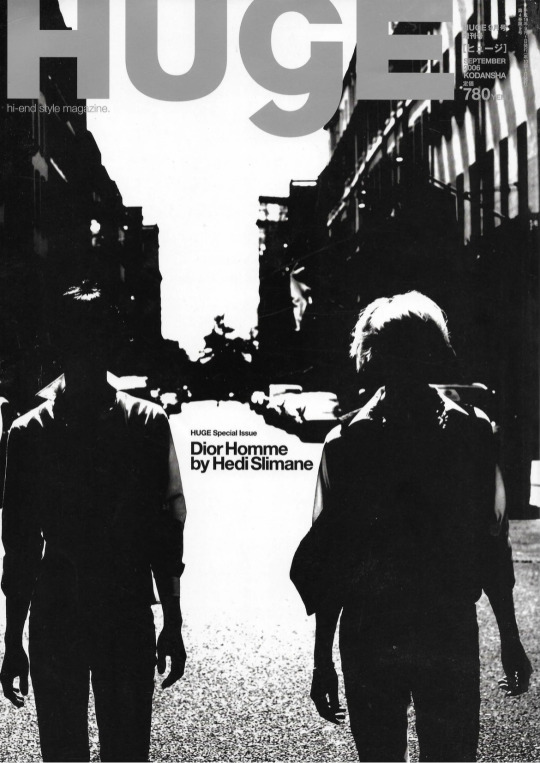


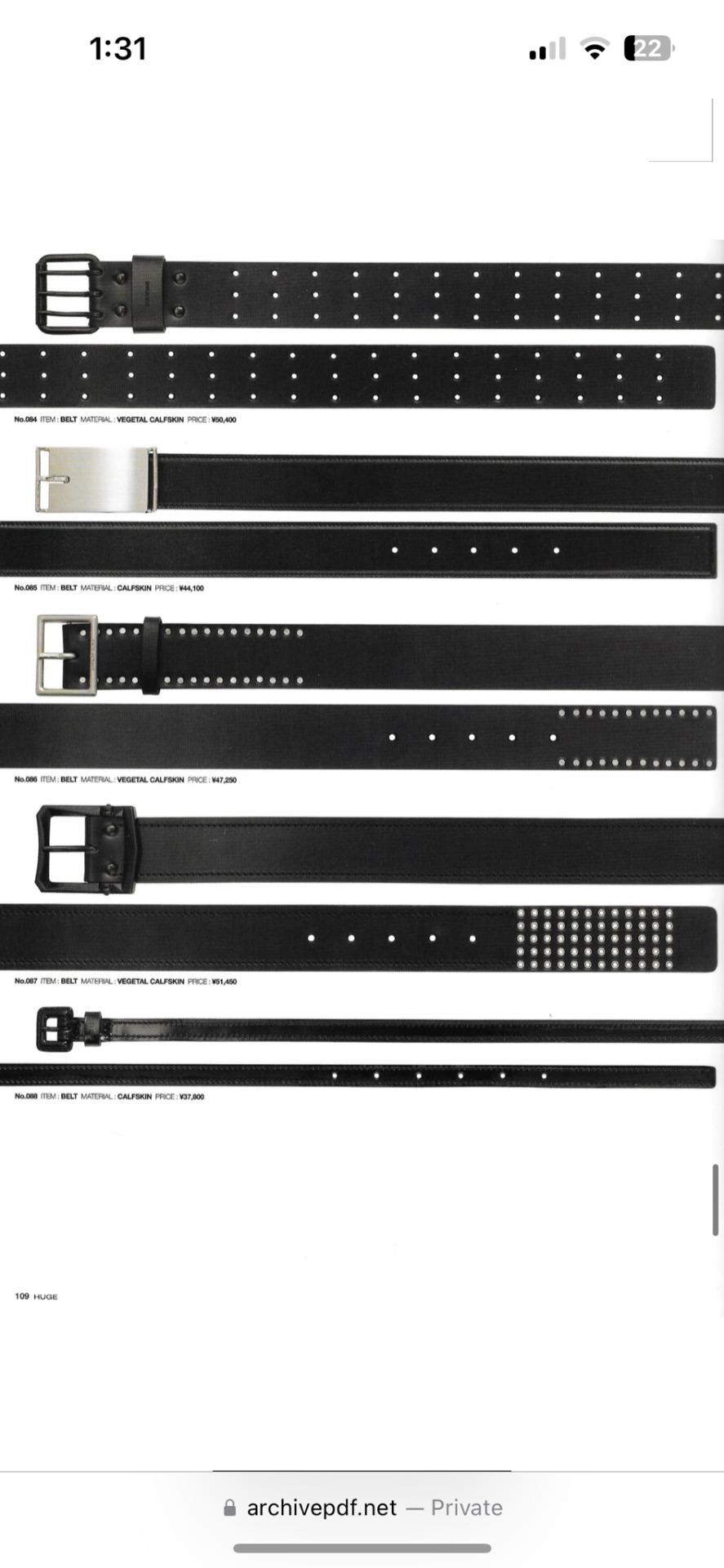
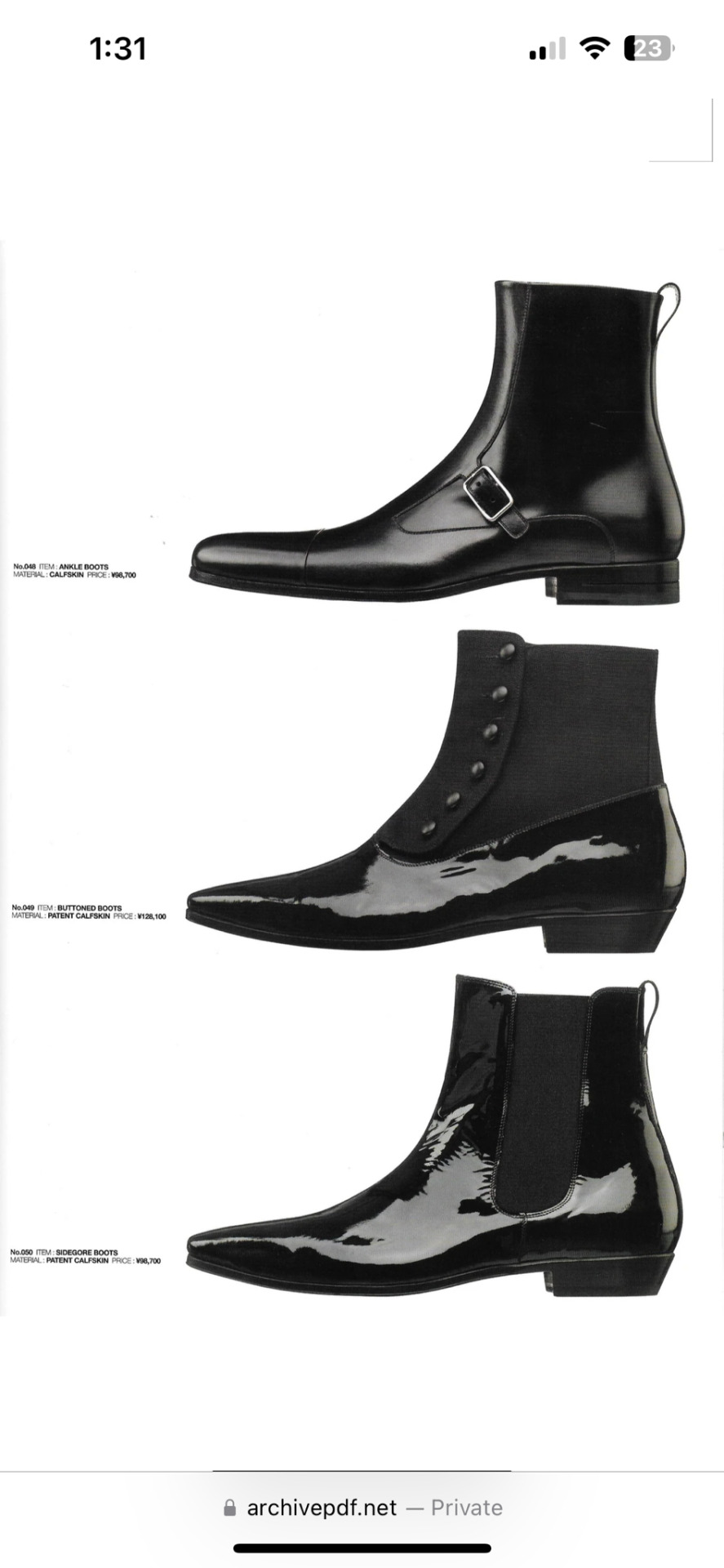

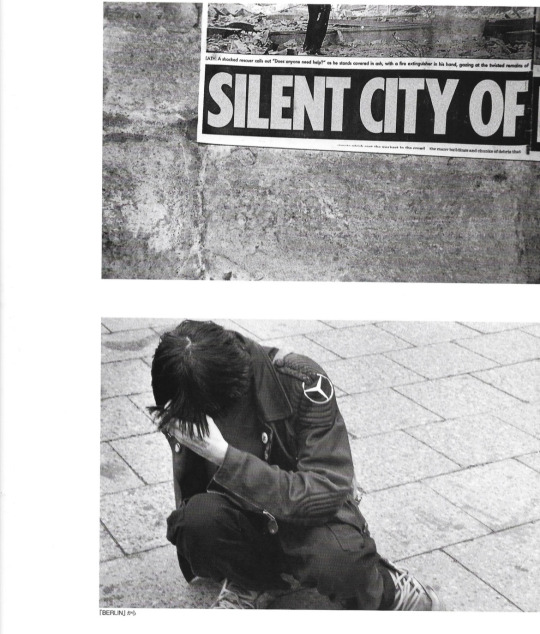
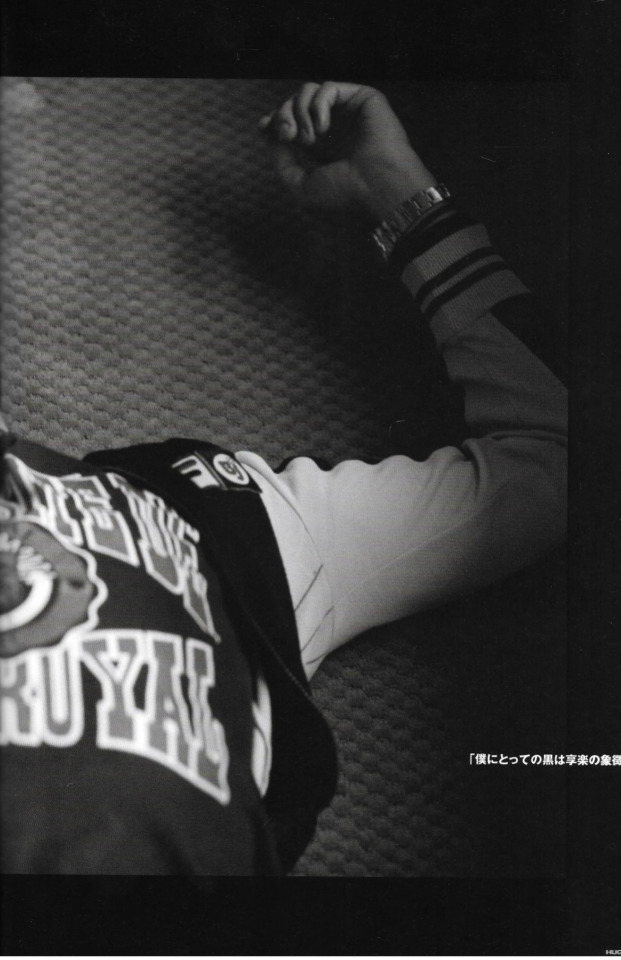
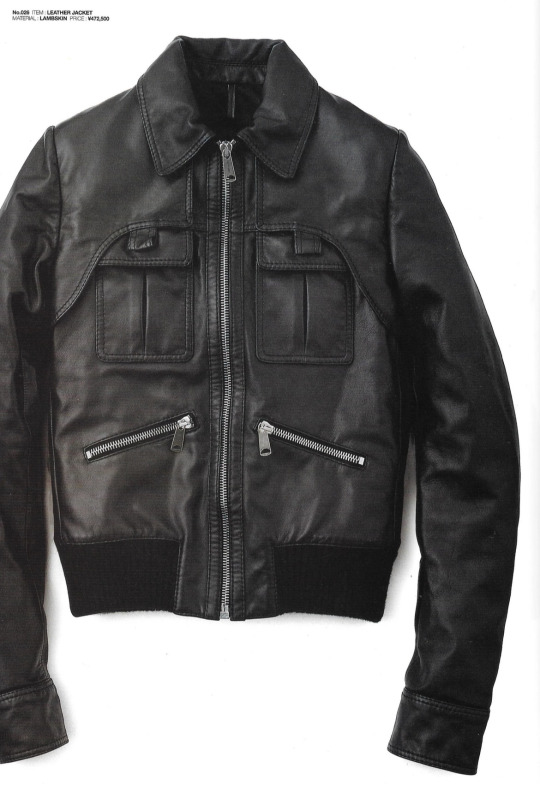

Dior Homme by Hedi Slimane for HUGE Magazine AW 2006 Showcase
56 notes
·
View notes
Text
I used to think that Spencer had a specific vision for the cello part of IWSNT that was inspired by Eleanor Rigby. This was just my own random conspiracy theory back then btw so it doesn't hold any actual weight. But hear me out...
So a big part of AFYCSO was created in the studio in summer 2005. The band talked a lot about how they bounced ideas off of each other and the fact that they had such varied musical tastes helped the album become what it is. Ryan wrote most of the lyrics, but the whole band was involved in creating the songs & music.
Ryan told East Coast Rocker in spring 2006 that “We all had so many ideas, and we were so excited that the songs just came out. The first half of the record is comprised of the first set of songs we wrote as a band.
Brendon said in summer 2006 that "For the first half, we wrote the music first and then [Ryan] wrote lyrics to sort of fit the feel. For the second half, the songs, Ryan would write lyrics like this storytelling kind of picture. We would write music based around that."
Brendon told Hearts & Sleeves in early 2006: "The way it comes out I guess is just a product of everybody in the band having huge similarities in music but we also listen to a lot of different stuff.... A lot of that was Ryan would pop up and be like ‘I think it could do this’ and Iʼd be like ‘whoah’ and Iʼd add some pop to it. Itʼs just a mix of different combinations of where we come from."
Ryan told PlayMusic in August 2006: “Between us we had a lot of influences so we just thought, ‘let’s use them all!’”
Ryan talked to Helio at the end of the Fever era about the songwriting process for the first album: “when I had a little bit of the music and lyrics finished, I would bring it to Spencer and Brendon and we would all finish the songs together.”
The point is that they were all contributing to creating the songs (ok Brent not as much lol). Moving on...
The band said that they mostly worked on the songs in the order that they appeared on the album and that they tracked all of their music parts separately (ex: they said they started tracking drum parts in late June, the bass parts were done by early July, and then they moved onto guitar). The verses for IWSNT were written a few days before they finished recording around the third week of July, but they worked on other parts of IWSNT earlier that month too.
Brendon's livejournal post on July 3rd had the title "i look at all the lonely people…"
Ryan mentioned several times over the years that Spencer introduced him to The Beatles while the band was in the studio. Ryan specifically picked Eleanor Rigby as a "song that changed my life" for Kerrang Magazine and said “I started really getting into The Beatles when we were recording [AFYCSO]. Our drummer, Spencer, started playing me some of their stuff."
I used to like to think that Spencer played Eleanor Rigby to point out the cello and then that was where a tiny bit of the inspiration for the sound of IWSNT came from. Obviously Spencer could have played Eleanor Rigby for any number of reasons, sooo I guess the only actual solid takeaway is that that song *possibly* inspired the band while they were in the studio (and then they went on to cover it during the NRWC tour).
24 notes
·
View notes
Text
Home scanned (and roughly translated) Japanese Aquabats Interview!
From Doll Magazine January 2006
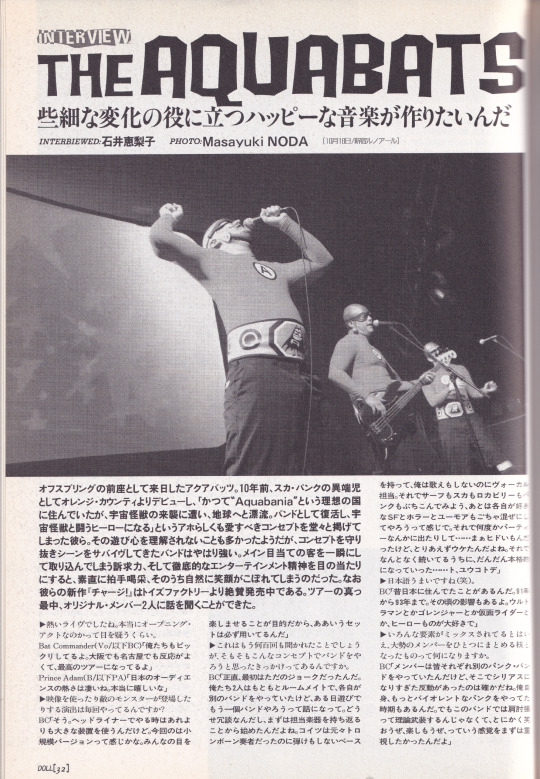
The Aquabats, who came to Japan as the opening act for The Offspring. Ten years ago, they debuted from Orange County as mavericks of ska-punk. They once lived in an ideal country called "Aquabania," but after being attacked by space monsters, they drifted to Earth. They revived as a band and boldly embraced a jellyfish-like dream concept of becoming heroes fighting space monsters. Although their playful spirit was often misunderstood, they stuck to their concept, transforming the stage into a psychedelic, blanket-wrapped world, and instantly captivating the audience with their centripetal force and thorough entertainment spirit. When you see it, you can't help but applaud, and soon a natural smile appears on your face. Their new work "Hi-Five Soup!" is now on sale in Japan. In the midst of their tour, we were able to talk to two of the original members.
▶ It was a hot live performance. I couldn't believe it was just the opening act. Bat Commander (Vo./Below, BC) "We were surprised too. The response in Osaka and Nagoya was great, and it's been an amazing tour." Prince Adam (B/Bass, Below, PA) "The passion of the Japanese audience is incredible. We're really happy."
▶ Do you always use visuals and have monster enemies appear during your performances? BC "Yes. When we're headlining, we use even larger equipment. This time, it's sort of a small-scale version. It's to catch everyone's eye."
▶ At the live show, your performance was very energetic. It's hard to believe you were just an opening act.
Bat Commander (Vo./BC): "We were surprised too. The response in Osaka and Nagoya was great, and the tour was awesome."
Prince Adam (B/Bass/PA): "The passion from the Japanese audience was amazing. We're really happy."
▶ Do you always use visuals and have monster enemies appear during your performances?
BC: "Yes. When we are headlining, we have even more extensive equipment. This time, it's a scaled-down version to catch everyone's eyes."

PA: "Our costumes and the concept of heroes fighting space monsters came from being inspired by tokusatsu shows and sci-fi films. We thought it would make our live performances more fun and unique."
BC: "When we perform, it feels like we're in a different world. The energy from the audience gives us the strength to keep going. It's an amazing feeling."
PA: "One time, we accidentally broke a piece of equipment during a show, but the crowd loved it. They thought it was part of the act! We've learned to embrace these moments and just go with the flow."
BC: "Yeah, it's all about creating an experience for our fans. We're not just a band; we're entertainers. We want people to leave our shows feeling happy and inspired."
PA: "Being in Japan has been incredible. The culture, the food, the people—it's all so different from what we're used to, but in the best way possible."
However, there are people who say this in anger: “It's just a party, nothing will change. It's just BC. Yes, I admit it, it's just BC.”
In the era of The Clash and The Pistols, information itself was impactful. Just appearing had a huge impact, and people believed music could change something. But now, there is too much information and music, making it difficult to stand out.
Even now, there are songs criticizing the government and social corruption. But no matter how much Bob Marley or The Clash sang sincerely, nothing has changed. When looking at reality, you realize that sincerity alone doesn't bring change.
Even if you don't change the world, making a small change in people's consciousness can be enough. That’s why some people think music is fun. It's not about making a big change but creating small ripples in people's minds. That’s why I believe in conveying my thoughts through music—not by forcing them onto others, but by sharing my perspective.
Bat Commander (BC): "We also always use a ‘big’ plan in our performances." “It's basically about having fun."
PA: "We were surprised and delighted by the warm reception from the Japanese audience! Performing in Osaka and Nagoya was incredible."
BC: "When we perform on our own, we bring larger sets, but this time it was a smaller, scaled-down version to suit the event."
BC: "To be honest, the band formation concept was initially a joke. My roommates and I used to toy around with different instruments. One day, we decided to take the joke further and actually form a band. At the beginning, we just played at parties for our friends.”
PA: “Even though we have different musical backgrounds, the reactions from our audience have always been positive, and that's because everyone in the band is talented in their own unique way.”
▶ Speaking of music, in the beginning, the ska/punk sound was stronger, wasn't it?
BC: At first, we were a nine-member group with a horn section. From the start, about 10 years ago, we were asked if we would continue with that style, but as you mentioned, we gradually moved towards a more practical approach (laughs). We felt that way and reduced the members to five. But the horn section's sound moved to the keyboard and guitar. That's a natural thing.
▶ What is the charm of ska?
BC: For me, the initial ska punk scene was like a source of energy. I started with that feeling but I really love the sound of ska. It's true that I also liked other genres like punk, rockabilly, and new wave just as much. Each of those elements is now blended into our sound. That's why our fans are diverse. We've got punk fans, ska fans, surf fans, and even new wave and nerdy types. We get everyone from old-timers to little kids. You can see Mohawk-donning dads bringing along their 4- or 5-year-olds. It's pretty interesting! ▶ Even if the music is whatever, the appearance of this white face has nothing to do with it. BC: Well, that's right. It wasn't a calculated style, but with this, I have the freedom to do anything. This costume gave me that freedom. Recently, music and fashion have been more closely related. This kind of style allows me to go into any genre of music. Wearing this kind of brand makes me feel like I can do anything. So, even if I do something like a superhero style, it's totally fine (laughs). This is the ultimate freedom.
Pages were roughly translated with the help of AI in case anything repeats or seems sloppy!
16 notes
·
View notes
Text
I want to share my first okami impressions/memory cause it's so strong in my mind.
My family stops into GameStop for something. It's 2006 most likely. There's one or two gaming systems set up for customers to try out and play video games.
On the ps2 one, someone is playing this wolf game. They're a white wolf running around and trying to wall jump. The background/sky box is just a black void.
I just stop everything and watch. I am transfixed by the animation style. Even the black outlines are moving and animated. It looks like a dreamscape. Just a white wolf in a void, aimless but ever moving.
I do not get to play the game. I do not learn the name of the game. But the imagery sticks with me.
My family gets nintedo power magazines and it's probably 2008. There's a huge featured article, Okami. I look at the screenshots and my memory is jogged.
Can it be? It looks like that same wolf game! But surely not, that's impossible. But it is! I learn it's a port.
We get the game when it releases and I learn that the black void is a tutorial area. It looks incredible and the dreamscape motion is just like a remember!
<3
#i have such a strong memory of walking into gamestop and watch someone play this 'wolf game'#and leaving knowing nothing about it#only to rediscover it via the wii port#okami my beloved#okami#personal
19 notes
·
View notes
Note
🏳️🌈
(Drop a 🏳️🌈 in my inbox and I’ll respond with a queer media recommendation!)
No Straight Lines: Four Decades of Queer Comics is a queer comic anthology edited by Justin Hall. It was used as the basis for a 2021 documentary which I haven't seen yet myself, but I'm very much looking forward to checking out, called No Straight Lines: The Rise of Queer Comics.
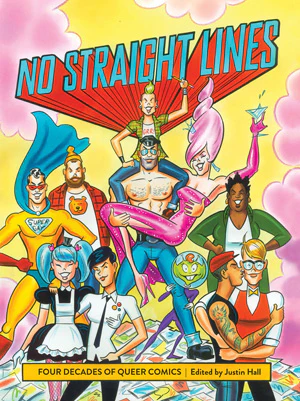
The official description:
Queer cartooning encompasses some of the best and most interesting comics of the last four decades, with creators tackling complex issues of identity and a changing society with intelligence, humor, and imagination. This book celebrates this vibrant artistic underground by gathering together a collection of excellent stories that can be enjoyed by all. No Straight Lines showcases major names such as Alison Bechdel (whose book Fun Home was named Time Magazine's 2006 Book of the Year), Howard Cruse (whose groundbreaking Stuck Rubber Baby is now back in print), and Ralf Koenig (one of Europe's most popular cartoonists), as well as high-profile, cross-over creators who have dabbled in LGBT cartooning, like legendary NYC artist David Wojnarowicz and media darling and advice columnist Dan Savage. No Straight Lines also spotlights many talented creators who never made it out of the queer comics ghetto, but produced amazing work that deserves wider attention. Until recently, queer cartooning existed in a parallel universe to the rest of comics, appearing only in gay newspapers and gay bookstores and not in comic book stores, mainstream bookstores or newspapers. The insular nature of the world of queer cartooning, however, created a fascinating artistic scene. LGBT comics have been an uncensored, internal conversation within the queer community, and thus provide a unique window into the hopes, fears, and fantasies of queer people for the last four decades. These comics have forged their aesthetics from the influences of underground comix, gay erotic art, punk zines, and the biting commentaries of drag queens, bull dykes, and other marginalized queers. They have analyzed their own communities, and their relationship with the broader society. They are smart, funny, and profound. No Straight Lines will be heralded by people interested in comics history, and people invested in LGBT culture will embrace it as a unique and invaluable collection.
I stumbled across this anthology totally by accident, back when my husband was working at a used bookstore and I'd hang out to browse new arrivals. I scooped it up because it felt important to have it, even though I wasn't a huge comics reader at the time. Now that I've gotten significantly more into comics, I'd say this is a must-have for any queer comic collector. There's so much collected in a single volume, and it's really incredible to hold a piece of queer art history like that. It makes me want to go work on my own art, which is pretty much the highest praise I can give any piece of media.
Ask For a Rec | Other Media Recommendations | Support Links
19 notes
·
View notes
Text


Huge magazine special issue ‘Dior Homme by Hedi Slimane’ 2006
23 notes
·
View notes
Note
i just reread ur Love Potion no. 9 and now I’m thinking about es!dean cooking ls!sam a ribeye bc he has a KITCHEN here and ls!sam trying to make himself eat it <3 anyway love ur stuff so much
EEP! thank you anon! i love domestic winchesters so much, lol!
this idea crawled into my head and stuck there until i wrote it. this is humiliatingly long but thank you for the prompt!!! your brain anon!!!
mwah!! mwah!!! <3
the smell brings sam into the kitchen. younger dean is standing near the stovetop, shuffling dishes around. when sam clears his throat, about to ask what he's making, the kid jumps.
"are you making dinner?" sam asks, confused. dean picks up the dishtowel, wiping his hands. sam's younger self and older dean went out to get extra spark plugs for the old junker in the garage an hour ago, and sam was planning on reheating some takeout from the other night.
dean hasn't dropped the dishtowel, kneading it between his hands like he's trying to strangle it.
"yeah, y'know. grandpa told me that i--he--us. we? do a lot of the cooking."
sam rolls his eyes because dean has gotten in the habit of calling older dean 'grandpa' and 'the geezer' and 'ol dusty.' it's cute.
but gosh, the smell. sam's stomach roils. dean must see something shift on his face because he's quick to explain.
"d'you remember when we were stuck outsida asheville? and the only thing we had were those hotdogs?"
sam can't help but wrinkle his nose. he definitely remembers. dean had done everything he could do dress them up and make it different, but they went on a hotdog strike for months after, only choosing other food if they had a choice.
"i got real handy with the grill. that's...kinda the only gourmet cooking i've got under my belt. i asked, but. uh. anyway. i made you steak? a ribeye steak?"
it sounds like a question at the end and sam's stomach sinks because oh shit. dean made this. dean made this for me. sam looks over dean's shoulder, easier than it would be if dean were his older self, pounds of muscle not packed in yet.
that's where he's been. he's been in here since before the other two even left. cooking dinner. for sam. to eat.
it's not even a question of if sam's going to do it. because he is going to do it.
it's a question of how neutral can he make his face as he chokes it down.
and oh god, it's huge. the steak is as big as dean's face, and sam knows for a fact that he must have picked it out specifically, because dean did not have that thing in their fridge.
sam's stomach goes wobbly with the image of this little dean, trailing in aisles in the local grocery store with a hat pulled low over his eyes (like they had all agreed to do until this blew over), deciding which steak sam would like the best.
"oh wow!" sam says, trying to sound encouraging. "it's big."
dean flushes fourteen different shades of pink over a period of ten seconds, and yeah. sam sighs. he's going to eat the fucking steak.
six minutes later, after dean had pushed sam down into a chair and let his hand on sam's shoulder linger for two seconds longer than it should have--
(and really, dean is not smooth. sam wished he had known back in 2006 that dean was this easy to fluster because he would've fallen to his knees in shitty motel carpet ten years early and saved them all a lot of heartache.)
--sam is staring at easily sixteen ounces of meat. to dean's credit, it looks like it should feature on a grilling magazine or something. but all sam can smell is the slightly seared odour of flesh.
"and i heard that you like greens, so--" sam tears his eyes away and dean awkwardly balances a bagged salad in his hands. sam feels like crying. this is going to be a rough few minutes.
"share it with me," sam asks, begs really, but dean just shakes his head.
"nah, man. i made it for you. i've got one for me." and sure enough, sam's stomach sinks as dean brings over another plate to the table with a much more reasonably sized offering.
"great." sam says, smiling bleakly. his throat is clogged and thick when he swallows. he tastes acid at the back of his throat. they sit in silence for a few minutes while sam pops the salad bag, trying to frantically puzzle out how he's going to eat this thing.
he could eat it as fast as possible? give his nerves less time to process the hot skin sliding down his throat. but the chances of him throwing up would increase exponentially. he could chew and hide bites in his napkin? but dean would catch it.
sam's stomach sinks. he's going to have to chew it. and swallow it. and let it sit in his stomach. heavy and full. skin grease and meat tearing under his teeth. sam's mind whites-out with the memory of the cage, of being forced to eat his own thigh down to the bone.
"so..." dean asks, "how long have we lived here?"
sam looks up, and realizes that dean is gripping his beer bottle so tight that it looks like it might shatter in his hand. sam softens. kid looks like he's going to shit himself.
"you know i can't tell you that." sam chides. and he picks up his fork. he picks up his knife. he braces himself. and he cuts.
"and what are your...what are your plans?" dean asks, thirty minutes later. they've been talking back and forth, trading memories of things pre-2006. sam's been trying to keep this strictly common knowledge, and dean--unlike sam's younger self--takes it mostly in stride.
sam feels an automatic reflex to burp rising in his throat, and he locks his muscles as much as he can because if he feels the taste of aerosolized meat in his mouth again, he will vomit.
half the steak is gone, and dean's food is completely gone. he doesn't seem to be in any rush, and keeps giving sam more beer. sam keeps having to take sips after each bite to wash the taste away as soon as he can, so he appreciates it. dean seems more and more surprised that sam isn't letting more slip, and sam smirks to think of how much of a light-weight he used to be.
is dean trying to get him drunk? sam's kind of flattered, he thinks.
"my plans?" sam repeats, raising an eyebrow.
"yeah. y'know. for the future."
sam looks at dean appraisingly. it could be a ploy for information, but for some reason, dean looks prematurely disappointed, like he's bracing himself for bad news. sam quickly takes another bite, thin enough that he can swallow it down without chewing at all.
"well." sam says, slowly. taking another swig of beer. "i've always wanted a dog. but--" he smiles. "'grandpa' says no. he's afraid it's going to get hair all over the car."
dean blinks at him. like he's waiting for something else. but when sam just stuffs another bite in his throat, dean cracks a hesitant smile.
"well. grandpa's very wise. i've always said so. dander is shit for leather."
sam smiles, rolling his eyes, when he hears footsteps.
"did someone grill out inside--" dean. older dean. he rounds the corner, and freezes when he sees the steak in front of sam. his younger self sitting across from him. "what the fuck?"
"dean, it's okay--" sam says, quickly, before dean can say anything, but dean is already storming across the room.
"did you eat this?" he demands, but before sam can say anything, dean whirls on his younger self. "he doesn't eat meat, jackass."
the younger dean blanches. "what? yeah he does. we eat burgers all the time."
"not my sam, one tree hill." dean turns around to face sam again. "are you okay?"
in truth, sam already feels the meat settling oddly in his stomach. he feels like he's going to be sick. but he just glares at dean instead, furious. the cage is sam's to tell--or sam's to bury, in this case. dean's tone is too acerbic for young dean to not pick up on the weight of it. it's clear from dean's tone alone that sam's aversion to meat is not a choice made on ethics.
younger dean looks like he's about to cry, sitting back in his chair. silence stretches for a second.
"give us a minute." sam snaps. dean flushes a furious shade of scarlet.
"what the hell? i'm not--"
"dean." sam says, cutting. dean peters into silence, and sam looks at both deans, one furious and one crestfallen. "he was doing something nice."
"by forcing you to--"
sam puts a hand on dean's, pushing the plate in his hands down. he makes eye contact, and sees the concern there. dean's never been good at letting sam take care of himself, and sam can already see how a version of himself 'hurting' sam is making him ready to start throwing punches. he softens.
"i'm going to be fine. let me handle this, please. i'll catch up with you later."
dean's mouth twists up in a snarl. "sam--"
"later." sam repeats, and dean growls something unintelligible as he storms out of the room. sam sags forward, finally allowing himself to process how full and ill he feels. how the alien flesh in his stomach feels revolting, thick.
"why didn't you say anything?" a quiet voice. sam looks up, smiling a genuine smile this time, and allowing it to look as weird as it probably does.
"i can't." sam says, apologetic. he's not going to tell dean anything about it. he can't know. dean rubs a hand over his face.
"i'm not used to not knowing you, sammy." he murmurs, looking sick. he looks so young that sam's chest contracts. what a sorry pair they make.
"you know me." sam reassures softly. "i'm your little brother."
dean looks up at him then, huffing an unamused snort. they look at each other for a long while, sam tracing the round curves of dean's face. his wide eyes. sam wonders what dean sees when he looks at him.
"yeah. okay." dean says, finally. "'m sorry."
sam shrugs. "how about we get outta here? there's a diner down by the movies that makes a mean veggie burger."
dean nods, still looking lost.
"they also make the best pecan pie in the state. we've checked."
dean snorts, and there he is: sam's big brother. young, and lost, but undeniably here, in the swoop of his bottom lip as he smiles.
sam's chest expands with his first full breath in almost an hour, and something else. something warm.
"i'll be the judge of that." dean says, cocky and all false-reassurance. sam wants to kiss him. but he stands instead, and nods towards the door.
"lead the way."
~~~
i saw something the other day that suggested veggie!sam was a hot take, and i think i'm only a partial veggie!sam believer. i think it comes and goes--he has good and bad days.
i can only imagine the cage made sam's relationship to consuming meat weirder. but who knows! thank you again for the prompt anon!!!
-lizzy
#ask box#lizzy answers#ES/LS verse#anon <3#cw gore#only kinda? but i'm gonna be safe!#1.7k?? i just need to write the full fic at this point i'm rattling the bars of my enclosure
31 notes
·
View notes
Text

HUGE, SEPT 2006 | THESE GREY DAYS DIOR HOMME: AW06 x HEDI SLIMANE
#fashion#HUGE magazine#editorial#dior#fashion photography#hedi slimane#black and white#monochrome#00s#fall 2006#photography#u
45 notes
·
View notes
Text
fun facts from samantha, molly and courtney's new character pages! :D

Samantha’s hometown, Mount Bedford, is closely based on the real town of Mount Kisco, in Westchester County, New York. Grandmary’s house is based on a real mansion in Mount Kisco.
The architectural style of Grandmary’s house, where Samantha lives, is Queen Anne Victorian. These popular turn-of-the-century homes have an asymmetrical façade with gables, towers, porches, and balconies.
Samantha was the first American Girl character to be featured in a movie. On November 23, 2004, Samantha: An American Girl Holiday debuted on TV and played several times over the holidays. Nearly every Samantha doll and accessory sold out before Christmas!
In the Samantha TV movie, AnnaSophia Robb played Samantha and Mia Farrow played Grandmary.

Molly was one of the first three characters in The American Girls Collection, along with Kirsten and Samantha, when The Pleasant Company debuted.
The debut season of American Girl Mysteries in 2005 included a Molly mystery novel titled A Spy on the Home Front, by Alison Hart.
Molly and Nanea are the only two historical characters set in the same decade who aren’t part of the same stories like Cécile and Marie-Grace or Julie and Ivy.
In 2006, American Girl released the movie Molly: An American Girl on the Home Front, which starred Maya Ritter as Molly, and a famous Molly—Molly Ringwald—as Molly’s mother, Helen McIntire.
In 1989, a special catalogue focused only on Molly was released.
Molly is the only historical character from American Girl who wears glasses.
After American Girl created a doll of Molly’s friend Emily, illustrations were revised to make the book character look more like the doll.

Many American Girl staff members grew up in the 1980s and brought in pictures and memorabilia for inspiration during Courtney’s development.
Courtney’s teacher, Mr. Garcia, was modeled on author Kellen Hertz’s fourth-grade teacher, who had a mustache, and her 7th-grade biology teacher, who wore suspenders.
Courtney’s fashions were inspired by teen magazines like Seventeen, Tiger Beat, and Teen, and the bold, bright fashions seen in MTV music videos and TV shows like Saved by the Bell. American Girl designers also researched catalogues like Sears, Wards, and JC Penney.
For the photoshoot for Courtney’s book illustrations, the crew brought in arcade games, including PAC-MAN. They had a great time playing and sharing memories of going to arcades growing up. The girl models for the photoshoot had never seen a PAC-MAN machine!
The arcade right across from the food court at the Fashion Fair Mall was modeled on an arcade at the Fashion Fair Mall in Fresno, CA, where author Kellen Hertz often gamed during the summer.
Courtney witnessing the Challenger explode on TV with her class actually happened to author Kellen Hertz, which is a big reason why she wanted to write about it.
Like Courtney’s sister, Tina, author Kellen Hertz had a huge collection of scrunchies, which her little sister was constantly taking and losing!
#american girl#samantha parkington#molly mcintire#courtney moore#american girl doll#they used molly's beforever book 2 even though her abridged one is in the museum! :o#and eddie is there even though he was cut out of sam's books#and the models never seeing a pac-man machine makes me so old! :o
12 notes
·
View notes
Text
So I was looking through random magazine scans and my god-

HE (this random huge staff sonic plush that's been around since the dawn of the franchise) LIVES!!!!! (at least as of 2006)


#this is the most recent pic I've seen of him it makes me happy he was kept in such good condition for so long#(there might've been multiple for all I know but shhh)
31 notes
·
View notes
Text
I don't often do this, but I feel like I should start being more open about my ocs lol. Might help with my cringe culture conditioning.
Anyway, here are my BB ocs (so far!)
(Picrew link)

🎶 Luna Elise Fitzgerald
Birthdate is February 20th, 1955. 16 in her first appearance in fic, 43 by BB2K.
Face Claim: Lorna Luft (That is her in Grease 2, which released just 2 years after TBB)
Occupation: Music Teacher
Gender/Sexuality: Cis Female, Straight
Five Key Traits: Gentle, Organized, Loud, Loyal, Positive
Three Fun Facts
Has perfect pitch. Since her ambitions used to be rather humble, she saved it for parties and her students. She can also play quite a few instruments due to this, though prefers the piano.
Loves wearing sun hats, as her mother has a huge collection of them. It makes her feel close to her as they live cities apart. She has quite a few, including one or two from her mother's collection.
Loves to bake more than cook--she tends to stress bake as a consequence. Loves baking cakes the most--her favorite to bake is chocolate forest and cheesecake.
Name Origins: In universe her name is due to her deceased father, who was a literature professor and studier of mythologies. He loved the olden works of Virgil, and found the name Luna in his work Georgics. He and Luna’s mom loved this name a lot and gave it to her. There’s also a secret reason, but that’ll be revealed hehe. for irl, I thought it’d be neat for her to have a fantasical name like Elwood does. Her last name comes from the jazz singer, Ella Fitzgerald.
Love Interest: Elwood J. Blues
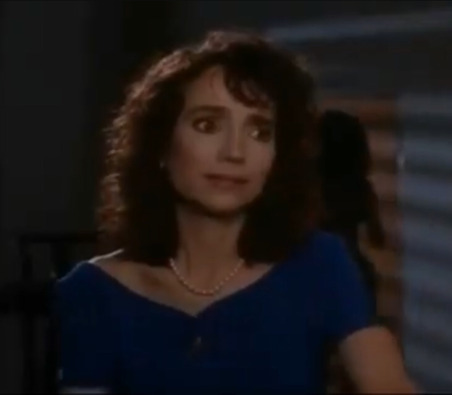
📚 Gretchen "Etta" Sophia Carter
Birthdate is May 25th, 1956. Her first "appearance" would put her at 24 as she's sort of in tbb, but her first real appearance is at 34.
Face Claim: Jessica Harper (that's an image of her in 1990, the year Etta and Jake met)
Occupation: Author, freelance editor (mainly for magazines and novels). Previously an English tutor and diner cook.
Gender/Sexuality: Cis Female, Bisexual
Five Key Traits: Understanding, Passionate, Ambitious, Articulate, and Humble
Three Fun Facts
Has been writing a poetry/short fiction mixed book on and off for years. It's her true passion, to write books... perhaps she'll be able to publish it soon.
Very well read. Originally wanted to be a professor at Columbia, but ultimately decided against it as getting her bachelors was hard for several reasons. She debates sometimes whether or not it was the right decision.
Loves to cook after writing. Finds it calming and endearing as she loves learning new recipes and loves making people happy through food. It's the easiest thing for her. Due to this, she used to be a cook at a diner in her younger years before doing freelance.
Name Origins: In universe, she's named after her maternal grandmother who was a famous actress. It wasn't out of the best intentions, but that's all I'll say for now. She gave herself the nickname Etta as she disliked the name Gretchen and felt it didn't fit her vibe at all--though she does respect her grandma. She does at least like the meaning though. In irl, she's named after two singers: Gretchen Parlato, and Betty Carter. Etta James actually wasn't the inspiration for her nickname, I just felt it'd fit her. It just came as a plus lol. Also, her original last name was actually Jones, but then I found out there was an actual Etta Jones (a jazz singer, too!) so I had to change it lol.
Love Interest: Jake E. Blues
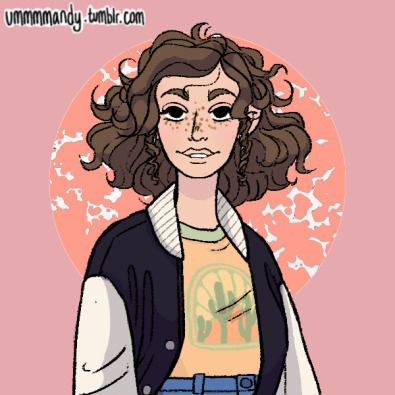
⭐ Katerina "Kat, Kitty" Anita Carter
Birthdate is November 18th, 1990. She's 15 1/2 in her first appearance (Summer 2006 is when the fic takes place)
Face Claim: Erm... (I find finding face claims for fan kids extremely hard, plus there's a lot of specifics to me that make narrowing down a face claim difficult. All I can really say is that she looks a lot more like her dad, with only a few of Etta's genes surviving the war. It's what Etta would prefer, anyway)
Occupation: Student, eventual Blues Brothers member
Gender/Sexuality: Cis Female, Bisexual
Five Key Traits: Passionate, Witty, Outspoken, Caring, and Courageous
Three Fun Facts:
On top of her love for the blues, she also loves punk and rock. Secret love for 2000s musicians too lol (like Britney Spears or Avril Lavigne)
Has a huge sweet tooth, inherited from her mother. Combined with a hard time brushing her teeth equals quite a few cavities in the past. Can't stop won't stop lol. She does get better at brushing with time, god bless
Was reading at college level by sixth grade. If she wasn't so shit at math, she probably would've been placed in advanced courses...
Name Origins: In universe, I'm keeping it just a bit of a mystery as to how Kat's name was workshopped as it’ll be revealed later. I can say her mother, Gretchen, really loved Anna Karenina. However, she didn’t want her name to be a full on reference to the book. Katerina was born! This isn’t a spoiler cause it’s subtly revealed in the first chapter lol, but her middle name, Anita, is from Anita O'day. Irl, tbh I really liked how Katerina sounded, plus I love characters that have long fancy names but prefer nicknames (thus, Kat). plus, I wanted the name to have Kat in it somewhere so she could eventually get the nickname "Kitty” (no bearing on my own nickname, I'm not projecting that hard) as many blues and jazz singers get that nickname. As mentioned in her mother's profile, her last name comes from Betty Carter.
Love Interest: Heh... wouldn't you like to know (it's a secret! No it's not Buster btw ew)
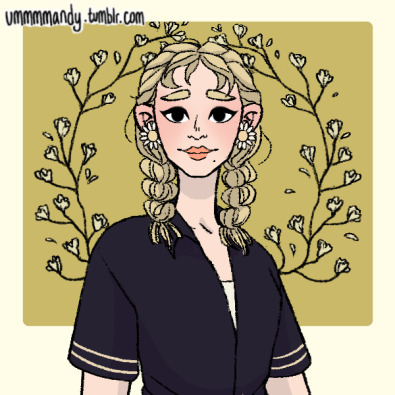
🖊️ Georgia "G, George" Louise Smith
Birthdate is June 18th, 1988. 17, nearly 18 in her first appearance
Face Claim: Erm... (She's not a fankid however since I can't find a fc for Kat, I decided to let Georgia be faceless as well)
Occupation: Student, eventually band/social media manager
Gender/Sexuality: Cis Female, queer/sapphic leaning
Five Key Traits: Organized, Shy, Polite, Calm, and Optimistic
Three Fun Facts
A big lover of boy bands. Collects posters and memorabilia. Never grows out of this, either--she'd be insane over Backstreet Boys coming back for example. She also heavily prefers 2000s musicians and Y2K culture. Jokingly debates with Kat about whether or not tbb are a boy band (Kat insists on being included despite not being a boy)
Despite being older, she views Kat as the older sister in their sisterhood. While more responsible, Kat is much more leader-oriented and outspoken than her. She's even taller than Kat by several inches but due to Kat's loud personality she's always felt small compared to her. She's a little envious of this.
Due to being entrenched in current trends, she also keeps up-to-date with social media and has a small following. Uses Myspace a lot, will eventually have at least two accounts on almost every social media. One personal, one tbb business
Name Origins: In universe, Georgia wasn't named by her parents. Instead she was named by the nurse who found her, as she was abandoned at a hospital. Smith is more or less a common last name she was assigned, as the nurse didn't want to become too attached to her </3 Unlike the other ladies on this list, irl Georgia wasn't named after any particular singer. She's instead named after a song, the famous "The Devil Went Down to Georgia" due to Kat's perceived influence on her (also "Georgia on My Mind" by Ray Charles is a plus) And yes, this will be mentioned/joked upon... eventually.
Love Interest: Only God knows atp
#the blues brothers#blues brothers#tbb#ocs#luna#gretchen#kat#georgia#kitty speaks#also thanks to cam (confidentandgood) for letting me put a spin on her oc template#i dont do this stuff often so i dont really have a nice oc template lol#spiced it up a little obviously#someday ill have commission money…
8 notes
·
View notes
Text


Guaranteed to win the Cannes Media Grand Prix. In 2006.
Another fun puzzle. But this one is much harder than the Tesco billboards two posts back. Find the Navy Special Ops soldiers hidden in ads throughout the magazine. Take a close look at the Miami ad. I'll give the answer at the bottom of the post.
But first, I know what you're thinking.
"Does anyone under 70 read magazines anymore?!"
Right. Seems a little late for this. Like by a decade or two.
And what big-time magazine cooperated with this genius media play? Skip Shot, the official quarterly magazine of US Water Polo. So not a magazine with a huge circulation.
Then again, if the Navy is after disciplined, buff people who don't mind spending a lot of time in the water, maybe it's a smart buy.
I imagine they were hoping to get a bunch of free publicity for the stunt their target would see. It's been a week, and so far the only coverage they've gotten has been from ad sites. Maybe they needed more NBA players and Fruity Pebbles.
And I hate to break it you, VML, but if Skip Shot isn't a member of the National Magazine Association, you don't qualify for a Kelly Award. If they're still giving out Kelly Awards.
The answer: Find the former captain of a water polo team in the scenic swamp, just above the second "u" in "artventurous."
Try to find the Special Ops soldiers in the other ads via The Ad Spot
#ads#advertising#adverts#creative advertising#advertising education#ad#print ad#magazine ad#VML#US Navy#recruitment ad#Navy recruitment ad#Skip Shot Magazine#Kelly Awards
3 notes
·
View notes